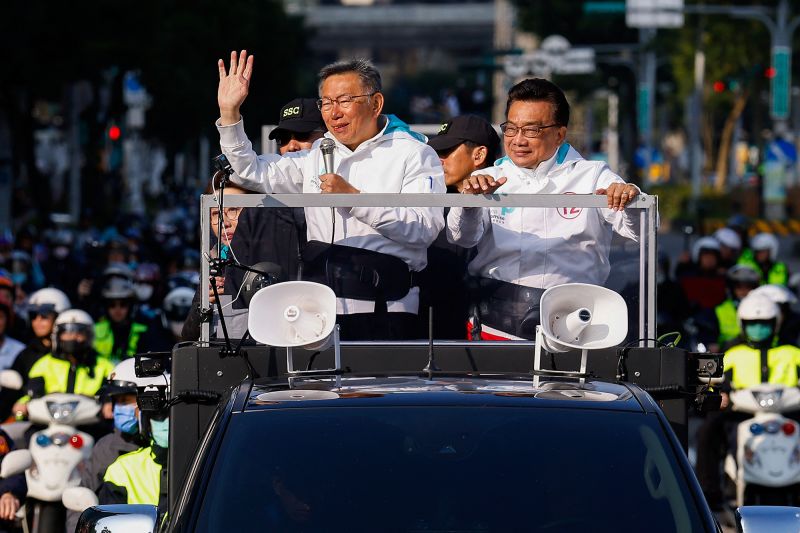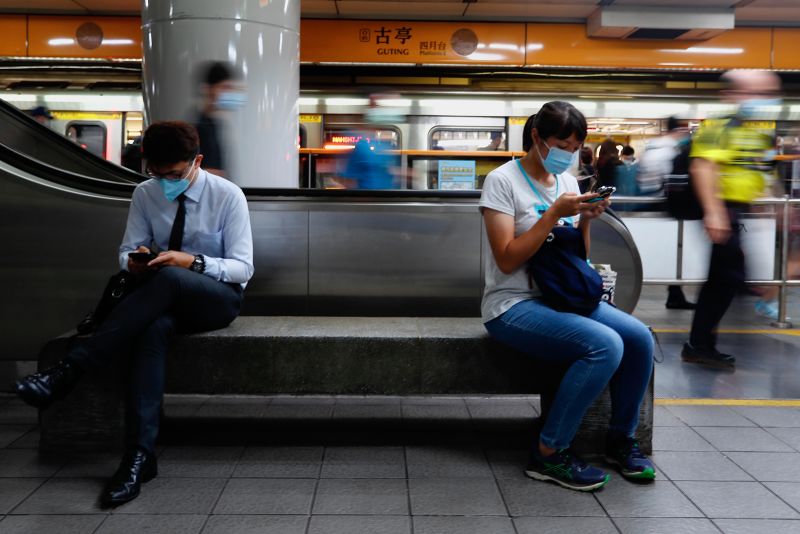
Taiwan's Upcoming Presidential Election: Implications and Potential Chinese Response

Taiwan's upcoming presidential election holds immense significance as it faces an assertive China The self-ruled island is under immediate pressure to choose a new leader who can navigate rising tensions and safeguard its autonomy
All eyes will be on Taiwan this Saturday as voters select a new leader amidst a more assertive China that has been escalating threats towards the self-ruled island for the past eight years.
The world will be observing not only the election results, but also the response of Taiwan's authoritarian neighbor. China's current leader, Xi Jinping, has stated that Taiwan's unification with the mainland is "a historical inevitability," even if it requires the use of force.
Taiwan experienced a change of government in 2016 when the Democratic Progressive Party (DPP) took power. In response, Beijing severed most communications with Taipei and escalated economic, diplomatic, and military pressure on the island. This has turned the Taiwan Strait into a major global geopolitical issue.
The ruling Communist Party of China considers Taiwan as part of its territory, despite never having governed it. Chinese Communist leaders have pledged to eventually achieve "reunification," with Xi linking the mission to his mid-century goal of "national rejuvenation." He has emphasized that the Taiwan issue should not persist for future generations.
Amanda Hsiao, the senior China analyst for the International Crisis Group, commented that this election signifies a shift in leadership during a time of heightened tensions between cross-strait relations, posing a greater challenge in preserving stability.
She also noted that while a conflict involving Taiwan is not expected in the near future, the global impact of such an event would be significant if it were to occur.
All three candidates are positioning themselves as the top choice to prevent a doomsday scenario, vowing to uphold peace and the current state of affairs - a priority supported by the majority of people in Taiwan, according to polls.
However, the three candidates have divergent strategies for reaching this objective. While they all emphasize the importance of enhancing Taiwan's defense capabilities to deter China's aggression, their policy priorities and approaches to dealing with Beijing vary significantly.
DPP Vice President Lai Ching-te stresses the importance of strengthening Taiwan's relationships with democratic allies such as the United States and Japan, while maintaining the stance that Taiwan is a sovereign nation in practice - a position that Beijing rejects.
Hou Yu-ih of the KMT emphasizes the need to resume dialogue and reduce tensions with China.
Ko Wen-je of the Taiwan Peoples Party (TPP) has urged for a more "pragmatic" approach to navigate the US-China rivalry, although he has not provided specific details on what this would entail.
Experts predict that Beijing's reaction could vary based on the election outcome, however, tension is expected to escalate in the future regardless of the elected leader, as the vast majority of Taiwan's 24 million people oppose China's "reunification" plan.
Livelihood issues such as low wages, high property prices, and Taiwan's slowly growing economy are expected to be key factors in how they vote, in addition to the threat from Beijing.
Ko Wen-je, the presidential candidate of the Taiwan People's Party (TPP), waves to supporters during a campaign event ahead of the election in Taipei, Taiwan on January 11, 2024.
Ann Wang/Reuters
Immediate pressure
China has made no secret of its preference in the tight race, framing the election as a choice between "peace and war, prosperity and decline."
Beijing openly opposes the DPP and Lai, who has previously identified as a "practical worker for Taiwan independence." Despite his shift towards favoring the status quo, Beijing still views him as a threat to their interests. The Taiwan Affairs Office issued a warning to Taiwanese voters, urging them to consider the risk posed by Lai in escalating cross-strait tensions and to make a wise decision regarding cross-strait relations.
Should Lai win, despite his narrow lead in the polls, China may respond with heightened economic or military tactics. "In the short term, it's probable that Beijing will attempt to exert maximum pressure in order to dictate the terms of future cross-strait discussions over the next four years," explained Wen-ti Sung, a Taiwan-based expert at the Atlantic Council's Global China Hub.
He mentioned that this could involve "strong diplomatic language criticizing the incoming DPP administration, implementing economic sanctions on specific exports, and increasing military presence in gray-zone areas to express Beijing's discontent."
People use mobile phones in Taipei City, Taiwan, 27 July 2020. —
People use mobile phones in Taipei City, Taiwan, 27 July 2020.
Ceng Shou Yi/NURPHO/AP
Taiwan faces a flood of disinformation from China ahead of crucial election. Heres how its fighting back
"Grey zone" tactics are aggressive state actions that fall just short of open warfare, a strategy that China has employed more frequently in recent years, particularly in the South China Sea and in its approach toward Taiwan. According to Hsiao, China may choose to reserve a more forceful response for a later time, if the newly elected Lai delivers an inauguration speech in May that does not align with Beijing's demands.
In August 2022, China conducted extensive military exercises near Taiwan in response to US House Speaker Nancy Pelosi's visit to Taipei. Beijing demonstrated its disapproval by launching missiles into the surrounding waters and simulating a blockade with fighter jets and warships, making it the most significant display of force in years. The international community will be closely monitoring the situation for any signs of further escalation.
Should Lai win, it would mark the first instance in Taiwan's democratic history of a political party being elected to a third term in power. This would also serve as a clear indication that China's strongarm tactics under Xi are failing to sway Taiwanese voters to abandon the DPP.
However, analysts predict that the DPP is unlikely to secure a majority in the upcoming election for the new legislature, which could result in significant policy-making deadlocks, particularly on contentious issues.
Hsiao said that the check that the Legislative Yuan would likely impose on a new DPP presidency should offer some degree of reassurance to Beijing on what the Lai administration can do.
Vice President Lai Ching-te, a presidential candidate for Taiwan's ruling Democratic Progressive Party (DPP), addressed a campaign rally in Keelung on January 8, 2024.
Tension down the road
Beijings preferred candidate is Hou from the KMT, which traditionally favors closer ties with China.
Hou has accused the DPP of intentionally provoking China and has committed to restarting discussions and improving economic relations with Beijing. He has also promised to revive a contentious trade agreement with China, which led to significant protests by students during the previous KMT administration in 2014.
Experts believe that while his election may temporarily reduce tensions, it will not be a lasting change. "After an initial period of improved relations, Beijing will continue to push for further advancements in the relationship, whether through new economic agreements or increased political cooperation from a KMT government," Hsiao explained.
"Given this, I believe a Hou administration would struggle to persuade Taiwanese voters. This could potentially lead to increased tensions once more."
Hou has been vocal about his opposition to Taiwan independence, as well as his rejection of China's "one country, two systems" unification proposal. Following Beijing's crackdown on freedoms in Hong Kong, which was handed over to China by Britain in 1997 under the same framework, this offer has lost its appeal in Taiwan.
Hou responded to a question from CNN on Thursday, emphasizing that Taiwan, like mainland China and the US, must take on responsibility and chart its own course in order to promote peace and stability in the region.
Pedestrians walk down a shopping street in Taipei, Taiwan, on Wednesday, Dec. 6, 2023.
Lam Yik Fei/Bloomberg/Getty Images
As Taiwan's election approaches, numerous young voters are expressing that China is not their primary concern. One individual articulated their position of opposing both Taiwan independence and Beijing's "one country, two systems" approach as "the middle path that Taiwan should pursue."
If Hou wins, experts say that cross-strait relations are unlikely to revert back to the friendlier years under former Taiwan President Ma Ying-jeou when the KMT was last in power. The Ma years marked a significant period of change.
Given the Chinese threats, the Taiwanese public has decisively shifted its stance away from China. Now, less than 10% support any form of unification, and less than 3% primarily identify as Chinese. The geopolitical landscape has also undergone significant changes, with China and the US engaged in a growing strategic rivalry.
Meanwhile, Ko from the TPP has been promoting a "middle way," positioning himself as a political outsider and a reasonable alternative to the two dominant parties.
As Taipei's ex-mayor, Ko worked to strengthen connections with China, particularly the city of Shanghai, and emphasized that "both sides of the strait are one family."
However, Sung pointed out that Ko is a newcomer to the power struggle between the US and China.
If he were to become president, Taiwan's relationships with China and the rest of the world would enter unknown territory.
"Sung stated that Ko's track record of strategic ambiguity regarding his US-China policy would lead to positive reception from both sides."
"Both Beijing and Washington may initially give the next Ko Wen-je administration a grace period, granting it significant benefit of the doubt. The future outcome will depend on how the Ko administration manages its foreign policy and cross-strait policy."
Reporting contributed by Eric Cheung of CNN.

















